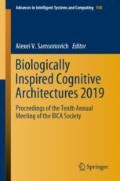Abstract
M-Path is an embodied conversational agent developed to achieve natural interaction using empathic behaviors. This paper is aimed to describe the details of the conversational management system within the M-Path framework that manages dialogue interaction with an emotional awareness. Our conversational system is equipped with a goal-directed narrative structure that adapts to the emotional reactions of the user using empathy mechanisms. We further show the implementation and a preliminary evaluation of our system in a consultation scenario, where our agent uses text-based dialogue interaction to conduct surveys.
Access this chapter
Tax calculation will be finalised at checkout
Purchases are for personal use only
References
Bartneck C, Kulić D, Croft E, Zoghbi S (2009) Measurement instruments for the anthropomorphism, animacy, likeability, perceived intelligence, and perceived safety of robots. Int J Soc Robot 1(1):71–81
Bates D, Mächler M, Bolker B, Walker S (2015) Fitting linear mixed-effects models using lme4. J Stat Soft 67(1):1–48
DeVault D, Artstein R, Benn G, Dey T, Fast E, Gainer A, Georgila K, Gratch J, Hartholt A, Lhommet M et al (2014) Simsensei kiosk: a virtual human interviewer for healthcare decision support. In: Proceedings of the 2014 international conference on autonomous agents and multi-agent systems, pp 1061–1068
Devlin J, Chang M-W, Lee K, Toutanova K (2018) Bert: pre-training of deep bidirectional transformers for language understanding
Heerink M, Krose B, Evers V, Wielinga B (2009) Measuring acceptance of an assistive social robot: a suggested toolkit. In: RO-MAN 2009-The 18th IEEE international symposium on robot and human interactive communication, IEEE, pp 528–533
Kroenke K, Spitzer RL (2002) The PHQ-9: a new depression diagnostic and severity measure. Psychiatr Ann 32(9):509–515
Lisetti C, Amini R, Yasavur U, Rishe N (2013) I can help you change! an empathic virtual agent delivers behavior change health interventions. ACM Trans Manag Inf Syst (TMIS) 4(4):19
Loper E, Bird S (2002) NLTK: The natural language toolkit. In: Proceedings of the ACL workshop on effective tools and methodologies for teaching natural language processing and computational linguistics. Association for Computational Linguistics, Philadelphia
Paiva A, Leite I, Boukricha H, Wachsmuth I (2017) Empathy in virtual agents and robots: a survey. ACM Trans Interact Intell Syst (TiiS) 7(3):11
Pedregosa F, Varoquaux G, Gramfort A, Michel V, Thirion B, Grisel O, Blondel M, Prettenhofer P, Weiss R, Dubourg V, Vanderplas J, Passos A, Cournapeau D, Brucher M, Perrot M, Duchesnay E (2011) Scikit-learn: machine learning in Python. J Mach Learn Res 12:2825–2830
Provoost S, Lau HM, Ruwaard J, Riper H (2017) Embodied conversational agents in clinical psychology: a scoping review. J Med Internet Res 19(5):e151
R Core Team (2018) R: a language and environment for statistical computing. R Foundation for Statistical Computing, Vienna
Nathan Spreng R, McKinnon MC, Mar RA, Levine B (2009) The toronto empathy questionnaire: scale development and initial validation of a factor-analytic solution to multiple empathy measures. J Pers Assess 91(1):62–71
Yalçın ÖN (in press) Empathy framework for embodied conversational agents. Cogn Syst Res J
Acknowledgements
This work was partially supported by the Natural Sciences and Engineering Research Council of Canada (NSERC) [RGPIN-2019-06767].
Author information
Authors and Affiliations
Corresponding authors
Editor information
Editors and Affiliations
Rights and permissions
Copyright information
© 2020 Springer Nature Switzerland AG
About this paper
Cite this paper
Yalçın, Ö.N., DiPaola, S. (2020). M-Path: A Conversational System for the Empathic Virtual Agent. In: Samsonovich, A. (eds) Biologically Inspired Cognitive Architectures 2019. BICA 2019. Advances in Intelligent Systems and Computing, vol 948. Springer, Cham. https://doi.org/10.1007/978-3-030-25719-4_78
Download citation
DOI: https://doi.org/10.1007/978-3-030-25719-4_78
Published:
Publisher Name: Springer, Cham
Print ISBN: 978-3-030-25718-7
Online ISBN: 978-3-030-25719-4
eBook Packages: Intelligent Technologies and RoboticsIntelligent Technologies and Robotics (R0)

